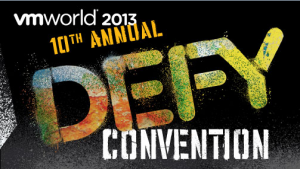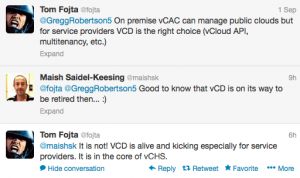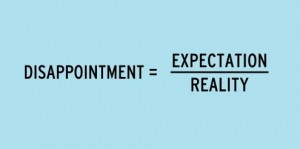 Overall I guess I feel disappointed. Over the last week I’ve been trying to keep up with developments from VMworld and to be honest it’s not been as tough as I thought because most of the announcements were already known quantities and very little ‘new’ information was given. I see this as a reflection of the growth and maturity of VMware – release cycles are getting longer, innovation takes longer to gestate, and the low hanging fruit of ‘wow’ features has been exhausted (and having written that I see Chris Wolf’s article which says much the same thing. I’m in good company). Chris Wahl’s blog has full details of the new stuff.
Overall I guess I feel disappointed. Over the last week I’ve been trying to keep up with developments from VMworld and to be honest it’s not been as tough as I thought because most of the announcements were already known quantities and very little ‘new’ information was given. I see this as a reflection of the growth and maturity of VMware – release cycles are getting longer, innovation takes longer to gestate, and the low hanging fruit of ‘wow’ features has been exhausted (and having written that I see Chris Wolf’s article which says much the same thing. I’m in good company). Chris Wahl’s blog has full details of the new stuff.
 UPDATE 4th Sept: It’s been pointed out to me that as a vExpert and blogger I do tend to have early access to both information and beta releases so what I consider new and what most attendees consider new is different. Fair comment.
UPDATE 4th Sept: It’s been pointed out to me that as a vExpert and blogger I do tend to have early access to both information and beta releases so what I consider new and what most attendees consider new is different. Fair comment.
Eric Siebert, a long time veteran of VMworld and the technology involved, has a great writeup of the main announcements along with his thoughts, which largely mirror my own. Maybe we’ve been spoilt over the years by the ‘cool’ factor of the vMotion and svMotion, maybe I woke up on the wrong side of bed, or maybe VMware aren’t delivering the goods as they used to.
vSphere ticks along
vSphere has been on a two year release cycle for major versions but that seems to have slipped. The next release of the core vSphere platform will be out later this year (probably at VMworld Barcelona as with v5.1 last year) but even when it does v5.5 is not much to write home about;
- SSO has been rewritten but it probably shouldn’t have been released as it was in the first place :oops:. OK, there are a few new features too.
- New maximums will probably only help the minority
- VSAN might be nice but isn’t even in beta yet and will still be an extra cost when it is released.
- We still have two clients, both of which are required. The web client has been improved but they haven’t discontinued the GUI client as expected.
- App HA is apparently significantly improved from previous editions but application support is still limited. Good for MS SQL maybe but there’s no Oracle, SAP etc. It’s also an Enterprise+ feature. SMP support for VMware’s FT feature (which could be great) is still just a technical preview with no release date.
- OK – vSphere Flash Read Cache is a nice addition, as is lifting the 2TB VMDK limit and OSX support for the remote console (a personal gripe there) 🙂 Shame vFRC is also Enterprise+ only…
- OK – the vCSA can now handle larger environments, but vCenter is still not a scalable, highly available service. Yeah, I’m grumpy.
If you look at the benefits they’re largely for the admin or behind the scenes. If I have to justify time and resource to upgrade my hosts, what benefit does the business get? I’m on Enterprise licencing, so precious little sadly. 🙁
vCloud Suite still isn’t as compelling as it should be
With public vs private vs hybrid cloud all the rage I can understand why VMware aren’t focusing on the hypervisor so I was expecting a big vCloud push. There was much fanfare about the launch of VMware’s public cloud, vCHS, but I’m still unconvinced;
- It’s launch is US only and is potentially missing some key functionality (though I think some of those referenced features are less in demand for enterprise apps). I accept that the US cloud market leads the world but as a European this leaves me somewhat in limbo – I’m sure it’ll reach us eventually but Amazon and Azure (among others) are already available….
- I’ve not seen any official statement from VMware so take it with a pinch of salt, but vCD looks like it’s on the chopping block and being replaced by vCAC (though both are still included in v5.5). This is a product that’s been at the pinnacle of VMware’s spearhead into the cloud market and it’s being ‘retired’ at only three years old? What about the vCloud Service Providers? Apparently it’ll live on for them but for how long? The launch of vCHS probably didn’t please too many service providers and this move looks set to alienate them further, along with many http://premier-pharmacy.com/product/accutane/ customers who have invested in vCD. One of the big selling points for vCHS is the seamless experience of running VMware’s stack for both your private and public clouds, but how do I start down that road today? Should I buy into the vCloud Suite and invest in vCloud Director knowing it’s going away? By the same token I know vCAC is going to change significantly in the next year or two and today it lacks key functionality like multi-tenancy. Maybe I should wait a year or two and see how things pan out? In that case, where’s the synergy in vCHS? Unfortunately VMware don’t have a great history in providing seamless upgrade paths – need I mention Lab Manager, Stage Manager, VDP…
After VMworld last year I speculated that VMware needed to accelerate their customer’s journey to the cloud or suffer and I don’t think this reshuffle/repositioning helps matters. For something of such strategic importance would you want to be an early adopter of the vCAC/vCD amalgamation? Dynamic Ops were initially a competitor to vCD, then post VMware acquisition they became mutually beneficial, and now vCAC is becoming the primary cloud solution. VMware have always excelled at promoting a vision which helped get ‘buy in’ – you knew that when you were ready for the next step it’d be waiting for you. Now I’m not so sure. On the bright side the pricing for the vCloud Suite seems better than I realised. Looking at pricing for vSphere Enterprise+ vs vCloud Standard it’s almost the same despite the fact you also get vCD, vCAC, and vCOPS with the vCloud suite.
 UPDATE 1st Sept: A twitter conversation with Tom Fojta and Dave Hill, both of whom work for VMware (though tweets are their own) implied that vCD may not be retired but merely realigned because enterprise and service providers need different solutions. This makes more sense as it will at least minimise the disruption. Let’s hope there’s some official clarification from VMware soon as I’m not the only one with concerns.
UPDATE 1st Sept: A twitter conversation with Tom Fojta and Dave Hill, both of whom work for VMware (though tweets are their own) implied that vCD may not be retired but merely realigned because enterprise and service providers need different solutions. This makes more sense as it will at least minimise the disruption. Let’s hope there’s some official clarification from VMware soon as I’m not the only one with concerns.
UPDATE 4th Sept: VMware have now provided a directional statement which confirms how this will affect customers, how functionality will migrate to vSphere/vCAC, and clarifies that vCD will continue in use with service providers.
EUC moves forward
I’m not much of an end user computing guy as my company haven’t bought into it conceptually, and with the release of the Horizon suite earlier this year we finally have some of the products VMware have been talking about for the last few years. I’m excited about the possibility of desktops in the cloud but Brian Madden, a well known VDI guru, seems to think the vision is spot on but execution and delivery are lacking.
SDDC is a grand vision but can it succeed?
I like the idea of the software defined datacenter but it’s going to be a tough sell for VMware. It’s disrupting major technologies, networks and storage, which are well embedded in the datacenter which puts them in competition with many of their major partners.
Storage is going through an exciting time and VMware are now beginning to promote their storage credentials. With the addition of VSAN and vFRC they’re pushing vSphere storage towards the ‘software defined’ concept they’ve coined although I was hoping for some advance on the Virsto acquisition. The announcements and sessions around NSX, VMware’s network hypervisor, do look interesting and if they can be successful we’re in for quite a ride! Maybe this is where VMware can recapture some of that magic they had four or five years ago. Even if they succeed the SDDC will arrive slowly because of financial, technical, and social factors. Given the potential complexity and disruption introduced by SDDC we need a clear value statement otherwise the perception may be that we’ll all be better off in a cloud where someone else manages it for us…
The process of writing and researching this article has actually made me more optimistic and I still think VMware have huge potential to innovate and disrupt (in a positive way) the datacentre of the future. I think I’m just grumpy because we still don’t have the VMTN Subscription! I’m sure I’ll soak up the boundless energy VMworld Barcelona generates and be back to my optimistic self later in the year.
Cloud threatens VMware


